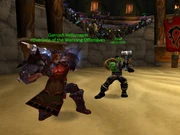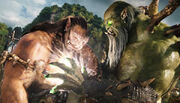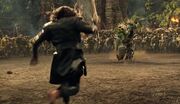Mak'gora (also written as mak'gora[1] or Mak'Gora[2][3]), meaning "duel of honor",[4] is an orcish custom whereby someone may challenge another person to individual combat. The ritualistic duel[5] has been often used to obtain a position of leadership, such as a fight for the position of group leader,[6] clan chieftain,[7] or Warchief of the Horde, but not necessarily. Mak'gora is practiced by ogre clans as well.[8]
Description[]

Shagara and Ashra in Mak'gora
Mak'gora used to be traditionally a combat to the death, but under Warchief Thrall's rule it became a non-lethal combat, though participants can choose to forgo this change.[1]
Refusing a Mak'gora can mean dishonor.[7] When used as a fight to the death, being spared can be perceived as a grave insult for orcs, at least for Thunderlords.[7] In one unnamed orcish clan, the participants were expelled from their clan and left for dead when they refused to kill each other during their Mak'gora.[9]
In ogre clans, only an ogre may challenge another ogre to a mak'gora, but the challenger may then choose a champion to fight on his/her behalf.[8]
The rules of a Mak'gora seem to be different between each Mak'gora since they are chosen and set by the participants themselves. Generally, there are thus no specific rules. There are only two consistent themes in all Mak'gora: once dropped, a weapon cannot be retrieved by either opponent and that the pair must fight to the death or until submission. Magic, for example, has never been stated to be forbidden, and has, in fact, been used in multiple Mak'gora duels and thus seems to be permitted. Similarly, many Mak'gora duels have involved both fighters wearing body armor as well, but it can also be forbidden when explicitly required.
For example, the "traditional", "old way" rules chosen for the Mak'gora between Garrosh and Cairne were:
- The combat was to the death.
- One weapon was allowed.
- A blessing of this weapon by a shaman of their choosing was permitted.
- Both body armor and clothing were forbidden, only a loincloth was allowed.
- Each participant had to have at least one witness.[10]
The rules chosen for the Mak'gora between Shagara and Ashra were:
- One weapon was allowed.
- Body armor was forbidden, but not clothing.
- The combat was to the death.[6]
In many instances of Mak'gora, no rules whatsoever are defined beforehand. For instance in both the first and the second Mak'gora between Thrall and Garrosh, the Mak'gora between Saurfang and Malfurion, or the Mak'gora between Saurfang and Sylvanas.
Instances of Mak'gora[]

The first mak'gora between Thrall and Garrosh.
- Issued by Fenris Wolfbrother to Garad in an alternate Draenor. Garad called Fenris a coward for secretly hunting gronn with the Thunderlord clan. Garad defeated Fenris, but he would not kill his own son. Insulted by being spared, Fenris left the Frostwolf clan and joined the Thunderlords.[7] It is possible that this holds true for the main universe as well.
- Issued by Orgrim Doomhammer to Blackhand the Destroyer,[11] calling Blackhand a traitor who had sold their people into servitude to dark forces.[12] Orgrim won with a blow that crushed Blackhand's skull, taking control of the Blackrock clan and the Horde at the end of the First War.[13]
- Issued by Garrosh Hellscream to Thrall. The duel, in the modern way, was interrupted when the Scourge invaded Orgrimmar.
- Issued by Cairne Bloodhoof to Garrosh Hellscream, who requested it to be a traditional duel. Garrosh chose Magatha Grimtotem to bless Gorehowl, who secretly applied poison to the blade. Cairne died when the poison prevented him from avoiding the axe. Because of the use of poison, Garrosh felt that Magatha cheated him out of a real victory.
- Issued by Ashra Valandril to Shagara. Ashra did not understand or care what Mak'gora entailed and just wanted a martial challenge to see who was truly fit to lead. Ashra lost but Shagara did not kill him.[6]
- Issued by Ga'nar to Durotan. Ga'nar believed that Durotan was not handling the Frostwolf Orcs as well as he should have been, and challenged his brother in the middle of the Horde Garrison. Durotan and Draka defused the situation, and Ga'nar backed down.[14]
- Issued by Thrall to Garrosh Hellscream. Garrosh lost and was killed by Thrall.[15]
- Hans'gar and Franzok are twin brothers who were each unwilling to slay the other in the rite of mak'gora and were banished from their clan.
- Issued by Malus to King Gordok, but the latter refused as the opponent wasn't an ogre. Instead, Malus's companion, the ogre Throgg, challenged the King in Malus's stead, yet Malus chose to be Throgg's champion and fight. Gordok died and Malus became new King Gordok, leader of the Dire Maul Gordunni clan.[16]
- Issued by Varok Saurfang to Sylvanas Windrunner at the gates of Orgrimmar. Saurfang wielded Thrall's axe and Shalamayne, given to him by Anduin Wrynn, against Sylvanas' twin blades. Though he succeeded in wounding her, Sylvanas slew him on the spot with an unknown dark magic and fled from Orgrimmar. Witnesses were Anduin himself and an anonymous Forsaken flagbearer.[17]
Other[]
- Malkorok threatened to challenge Baine Bloodhoof with a mak'gora if his objection to Garrosh's use of molten giants against Northwatch Hold was meant as an insult. Baine diffused the situation by stating he only spoke out of concern that abusing the elements in such a way may lead to another Cataclysm.[18]
- Varok Saurfang wished to engage in a mak'gora against Garrosh Hellscream in the aftermath of the Alliance-Horde war because he believed that the deposed Warchief had earned the right to an orcish mak'gora, meaning an orcish death in defeat, or a chance to repent in victory. However, Garrosh escaped from the Celestials before Saurfang's challenge could be revisited.[19]
- Varok Saurfang challenged Malfurion Stormrage to mak'gora to buy time during the Horde's attack on Astranaar. Malfurion rushed at Saurfang and attacked him with no care.[20]
- Gorgonna rose through the ranks and became chieftain of the Warsong clan through mak'gora.[21]
Warcraft film universe[]
This article contains information and lore exclusive to the Warcraft film universe, which is considered to be separate from the main Warcraft universe canon.
|

Gul'dan cheats during his mak'gora with Durotan.

Mak'gora between Blackhand and Lothar.
The mak'gora is an ancient tradition for the orcs on Draenor. It is a duel fought to the death between participants. It can be fought hand-to-hand or with weapons, but the use of magic is considered cheating.
Known mak'gora[]
- Issued by an orc from the Thunderlord clan to Grukag. The challenge was over the claim to prey during a joint hunt with Thunderlords and Frostwolves. Grukag won.[22]
- Issued by the leader of a group of Red Walkers to Garad. The Red Walkers were facing certain defeat during a battle against the Frostwolves. Garad was weakened by an illness caused by Gul'dan's knife during an earlier parlay. The Red Walker knew this when he issued the challenge and easily won.[23]
- Issued by Nokrar to Durotan. Nokrar and several other Frostwolves wanted to leave the clan and join the Horde, but Durotan refused to let them leave.[24] Durotan won but refused to slay Nokrar due to the dwindling numbers of their clan.[25][26]
- Issued by Durotan to Gul'dan. Gul'dan cheated by using fel to kill Durotan.
- Issued by Blackhand to Anduin Lothar. Blackhand wanted to avenge the loss of his hand during a previous fight with Anduin. Anduin won, avenging the death of his son by Blackhand and earning the respect of the orcs who allowed him to leave their camp peacefully.
Videos[]
Trivia[]
- On Classic Hardcore realms, players can issue a Duel to the Death by typing the command
/makgora.[27] - A popular misconception among the fanbase is that Thrall cheated in his final mak'gora against Garrosh when he used elemental magic. However, there has never been any rule forbidding the use of magic and spells. Moreover, there is a precedent for the use of magic in mak'gora, as both Shagara and Ashra made extensive use of it during their mak'gora. Thrall had also already used magic in the first mak'gora between him and Garrosh, by throwing lightning bolts.
- Another popular misconception is that Thrall became a weaker shaman as a result of killing Garrosh with elemental magic. In reality, it was his tremendous guilt, self-doubt and internal struggle that were the reason for him not hearing the elements anymore.[28]
See also[]
References[]
- ^ a b The Shattering: Prelude to Cataclysm, chapter 21
- ^ Ultimate Visual Guide
- ^ Hellscream
- ^ Sean Copeland on Twitter (2014-08-25)
- ^ World of Warcraft: Chronicle Volume 3, pg. 196
- ^ a b c Bloodsworn
- ^ a b c d Blood and Thunder
- ^ a b World of Warcraft: Traveler, pg. 320 - 322
- ^ Hans'gar and Franzok#Adventure Guide
- ^ The Shattering: Prelude to Cataclysm, chapter 21
- ^ Blood Ledger
- ^ World of Warcraft: Chronicle Volume 2, pg. 135
- ^ Tides of Darkness, pg. 34
- ^
 [10-40] To the Garrison
[10-40] To the Garrison
- ^
 [35-40] And Justice for Thrall (Nagrand Finale Cinematic)
[35-40] And Justice for Thrall (Nagrand Finale Cinematic)
- ^ World of Warcraft: Traveler, chapter 32 & 33
- ^
 [60] Before the Gates of Orgrimmar
[60] Before the Gates of Orgrimmar
- ^ Jaina Proudmoore: Tides of War, pg. 173 - 175 (ebook)
- ^ War Crimes
- ^ A Good War
- ^


 [50-70] The Kosh'harg
[50-70] The Kosh'harg
- ^ Warcraft: Durotan, chapter, 3 pg. 55
- ^ Warcraft: Durotan, chapter 5, pg. 84-86
- ^ Warcraft: Durotan, chapter 16, pg. 232-235
- ^ Warcraft: Durotan, chapter 17, pg. 244
- ^ Warcraft: The Official Movie Novelization, chapter 1, pg. 38
- ^
 Kaivax 2023-08-22. WoW Classic Era Version 1.14.4 Patch Notes - World of Warcraft Forums. Retrieved on 2023-08-22.
Kaivax 2023-08-22. WoW Classic Era Version 1.14.4 Patch Notes - World of Warcraft Forums. Retrieved on 2023-08-22.
- ^ Words of Wind and Earth#Doomhammer
